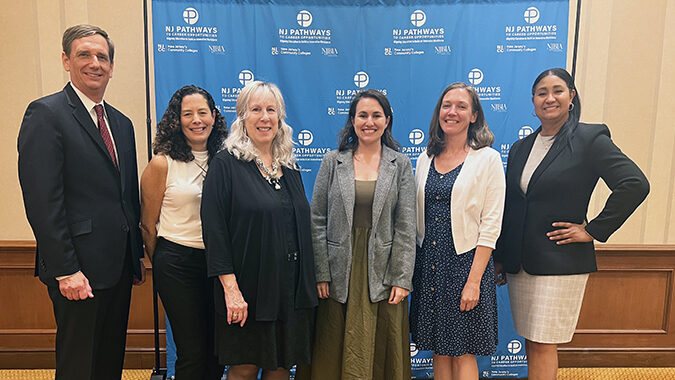Nearly 200 leaders from New Jersey community colleges, and their workforce and business partners gained insights from national experts during the New Jersey Pathways to Career Opportunities Summit aimed at advancing the transformation of education to align with workforce skills that businesses need.
The two-day event, held June 7-8 in Atlantic City, featured national thought leaders from Harvard, George Washington University and The Brookings Institution who discussed trends and innovations in education and training, lessons learned, stackable credentials and work-based apprenticeships.
“Informed by the insights of these incredible national thought leaders, we are charting the course for the future of the New Jersey Pathways to Career Opportunities Initiative,” said Aaron R. Fichtner, Ph.D., president of the New Jersey Council of County Colleges (NJCCC).
“Building on the momentum of the first year of the Pathways Initiative, our conversations with these experts will help us solidify a strong, flexible, and sustainable infrastructure of collaboration that engages industry and education partners across the state to align education to build an innovative workforce,” Fichtner said.
Speakers included: Rachel Lipson, former director and founder of The Project on Workforce at Harvard and co-editor of the 2023 book “America’s Hidden Economic Engines: How Community Colleges Can Drive Shared Prosperity”; Holly Zanville, Ph.D., a research professor at George Washington University and co-director of the Program on Skills, Credentials and Workforce Policy; and Annelies Goger, Ph.D., a fellow at The Brookings Institution whose research focuses on employers’ roles in talent development.
“All of us at The Project of Workforce at Harvard, believe Community Colleges offer immense promise for this country,” Lipson said. “Community colleges are at the center of their regional economies. Why are community colleges so critical? They are at the heart of our democracy. They combat economic inequality. They combat racial inequality. They combat geographic inequality. Simply put, community colleges will be at the center of the solution to bring more opportunity to more people.”
Zanville stressed the need for a more centralized national community college ecosystem that uses the same terminology for “stackable credentials with real connectivity.”
“We must know and learn what our neighbors are doing instead of just being hyper-focused on what our own state is doing,” Zanville said. “We must create one language that educators speak.”
Goger said there was a need for a more “permeable system” where “apprentices don’t have to choose between college and an apprenticeship.”
“Why can’t they do both?” Goger asked. “Workers often need technical skills as well as a well-rounded education. We need to normalize the combination of learning by doing in the workplace and academic learning in the classroom,” Goger said.
“Apprenticeship also does not have a great record of inclusion, specifically when it comes to including women and people of color,” Goger said. “We need to think about recruiting people earlier in their education and how we will provide all of the wrap-around support, mentorship, peer learning, and career coaching that we know helps people successfully stay on their learning and career pathway.”
NJ Pathways – formed by New Jersey’s Community Colleges and NJBIA – brings together industry and education partners to form a connected statewide education ecosystem guided by industry leaders to build an innovative workforce in the Garden State. This cutting-edge initiative now has more than 1,200 industry and education partners statewide helping to advance New Jersey’s economy.
“NIBIA is proud to partner with New Jersey’s Community Colleges on the New Jersey Pathways to Career Opportunities Initiative,” said Michele Siekerka, NJBIA president and CEO. “Businesses need to be part of the discussion to create curricula so they can find skilled and educated workers to fill their needs. We appreciate the expertise of these national thought leaders and understand the value they offer to help New Jersey’s economy have a more competitive workforce.”
NJ Pathways milestones achieved during “Year-One” include:
The creation of 10 Centers of Workforce Innovation in four sectors – (1) Health Services, (2) Technology and Innovation, (3) Infrastructure and Energy, and (4) Manufacturing and Supply Chain Management.
These Centers of Workforce Innovation – with New Jersey’s community colleges working together in an unprecedented way – have connected and enhanced 22 education and training pathways within the four fastest-growing industries in the state.
The creation of sustainable partnerships – “a paradigm shift” – between industry and education. The result has engaged industry to directly influence pathways so future employees will have the skills and training needed by business in New Jersey.
The entire initiative now has more than 1,200 industry and education partners. The Centers of Workforce Innovation include 20 high schools, 17 community colleges, 9 four-year colleges and universities, 8 labor unions, and 4 community-based training providers.
Moving forward to “Year-Two” of NJ Pathways, NJCCC announced the creation of an online repository at www.njpathways.org – to be completed later this year – to house Pathways documents and curriculum to share with education partners statewide.
Photo Caption: Aaron R. Ficthner, Ph.D., President, NJCCC; Maria Heidcamp, Chief of Innovation and Partnerships, NJCCC; Holly Zanville, Ph.D., Co-Lead, Credentials as You Go, Rachel Lipson, co-editor, “America’s Hidden Economic Engines”and Former Director, The Project on Workforce at Harvard; Annelies Goger, Ph.D., Fellow, The Brookings Institute; Catherine Starghill, Esq., Vice President and Executive Director, NJCCC.
About the New Jersey Council of County Colleges (NJCCC)
The New Jersey Council of County Colleges (NJCCC) was created in 1989 to support and promote New Jersey’s 18 community colleges. These colleges now enroll over 180,000 people each year in credit, non-credit, and workforce development courses at more than 70 campuses throughout the state. The New Jersey Community College Consortium for Workforce and Economic Development is a subsidiary of NJCCC. The consortium brings together the Community Colleges as a collective to provide workforce development training.

